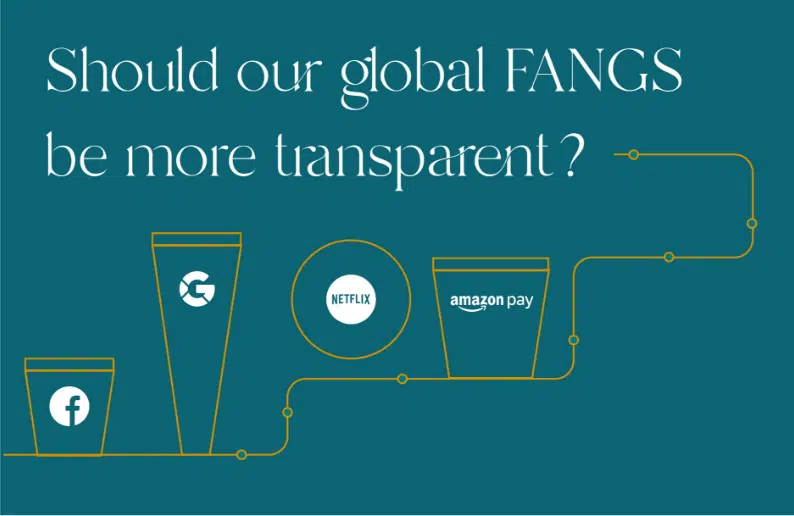
Should our global FANGS be more transparent?
It all started out as fun and games. We poked, we followed, we chatted, we played quizzes… but at some point, the fun stopped. As privacy scandal after privacy scandal piles up at Facebook’s door, and similar issues arise at Amazon, Netflix and Google, it’s time to ask, should our global FANGs be more transparent? We take a look at some of the privacy incidents that have rocked these organisations and consider what they mean for our online future.
Face-off at Facebook
It’s no secret that the world’s largest social media platform has racked up the scandals over the years. The most infamous of these centres around the collection of personal details of up to 87 million people by strategic communication firm Cambridge Analytica. Netflix’s The Great Hack explores in detail how the company harvested online information and used it for political gain, in particular to influence the US election and Brexit referendum.
The hack was achieved partly through a third–party review website which offered cash in exchange for surveys. Users were required to add the app to their profile and grant it access to their data, including their location, likes, friends list and private messages. This private information was then shared with, and exploited by, Cambridge Analytica. After the story broke, it emerged that Cambridge Analytica were also responsible for spreading conspiracy theories across the platform. But according to the UK’s Information Commissioner’s Office, the responsibility lay with Facebook itself. On October 25, 2018 they fined the social media giant £500,000 for their role in the incident. The situation also brought to light other detail-harvesting third–party apps – in particular those offering users online quizzes.
The scandal shocked many Facebook users, especially those who had unwittingly clicked on a quiz to discover which Disney princess they were, which city they should live in or what their future child would look like. The scandal showed us what these seemingly innocent quizzes really wanted – permission to access and use our data.
All change at Amazon
The Amazon Echo has been marred by controversy from the start. One of the very first smart speakers to hit the market, the Alexa device and its subsequent releases are still making waves in the media and beyond.
Smart speakers have personalised and simplified the way we use technology, but at what cost? With every voice command recorded and available to play back in the Alexa app, perhaps it’s time to consider the ramifications of this data getting into the wrong hands. Even if the data stays with Amazon itself, this still begs the question – do we want other people listening in on our lives?
Recently it emerged that Amazon is using its smart speakers to collect data on its users – and users are far from happy. A report by Bloomberg reported that Amazon employs workers to listen to voice recordings captured by the smart speakers, using them to improve Alexa’s human speech comprehension. But is this the extent of its use? At a time when consumers are more aware of privacy concerns than ever, perhaps Amazon owes us a more detailed explanation.
Never-ending Netflix picks
The largest video streaming service is very good at giving us what we want. Offering us an ever expanding, customised screen of shows and films on demand, at first glance Netflix’s algorithm is an asset to our online lives. But, just as other tech leaders have had to answer questions on privacy, so too has Netflix.
In 2017, Netflix’s own Twitter account poked fun at the 53 people who watched the Christmas love-fest ‘A Christmas Prince’ ‘every day for the past 18 days.’ This tweet drew consumers’ attention to the amount of information the platform has on our viewing choices.
The way Netflix collects and analyses this information has led directly to its success. Netflix uses data analytics to discover and keep track of what we watch, when we watch and how much we watch, and then uses this data to create detailed subscriber profiles and recommend relevant content.
Could this data be used in other, less savoury ways? In December 2018, the New York Times reported that Facebook provided Netflix with access to user messages. The ramifications of this have yet to be seen.
Get ahead with Google
Google offers us the world at our fingertips. The two-decade old search engine has changed the way we navigate our lives, but has it exposed us to privacy risks too? And when it comes to search results, should Google have a responsibility to show us fair, balanced results?
According to the European Union, it does. In 2018, the company received a $5 billion fine from the EU’s regulatory body. The European Commission found that Google was showing Android users its own shopping service in ads ahead of other search results.
Back in January, Google announced a timeline for putting new privacy standards into practice. These concern the use of cookies, the digital tool that tracks our online activity and lets digital publisher target advertising. The move will prevent third-party ad sellers from accessing our site visits, browsing and or shopping carts. This information will only be available through Google itself.
Here at Drew + Rose, we’re thinking deeply about whether these companies have too much access to our information. While we very much favour personalised experiences because of the value they bring to users’ lives, it’s important to consider privacy issues.
What are your thoughts on Facebook, Amazon, Netflix and Google? Are the issues raised a ‘necessary evil’ to provide us with better online services? And should we hold these companies to account? Let us know on Twitter!

